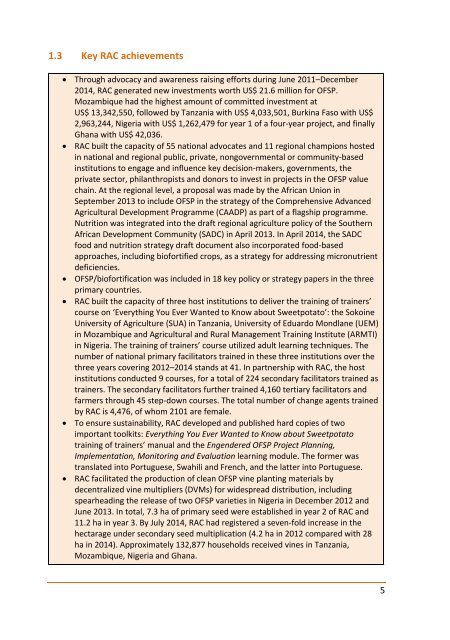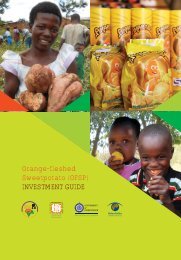Recommendation
Up89Y
Up89Y
You also want an ePaper? Increase the reach of your titles
YUMPU automatically turns print PDFs into web optimized ePapers that Google loves.
1.3 Key RAC achievements<br />
Through advocacy and awareness raising efforts during June 2011–December<br />
2014, RAC generated new investments worth US$ 21.6 million for OFSP.<br />
Mozambique had the highest amount of committed investment at<br />
US$ 13,342,550, followed by Tanzania with US$ 4,033,501, Burkina Faso with US$<br />
2,963,244, Nigeria with US$ 1,262,479 for year 1 of a four‐year project, and finally<br />
Ghana with US$ 42,036.<br />
RAC built the capacity of 55 national advocates and 11 regional champions hosted<br />
in national and regional public, private, nongovernmental or community‐based<br />
institutions to engage and influence key decision‐makers, governments, the<br />
private sector, philanthropists and donors to invest in projects in the OFSP value<br />
chain. At the regional level, a proposal was made by the African Union in<br />
September 2013 to include OFSP in the strategy of the Comprehensive Advanced<br />
Agricultural Development Programme (CAADP) as part of a flagship programme.<br />
Nutrition was integrated into the draft regional agriculture policy of the Southern<br />
African Development Community (SADC) in April 2013. In April 2014, the SADC<br />
food and nutrition strategy draft document also incorporated food‐based<br />
approaches, including biofortified crops, as a strategy for addressing micronutrient<br />
deficiencies.<br />
OFSP/biofortification was included in 18 key policy or strategy papers in the three<br />
primary countries.<br />
RAC built the capacity of three host institutions to deliver the training of trainers’<br />
course on ‘Everything You Ever Wanted to Know about Sweetpotato’: the Sokoine<br />
University of Agriculture (SUA) in Tanzania, University of Eduardo Mondlane (UEM)<br />
in Mozambique and Agricultural and Rural Management Training Institute (ARMTI)<br />
in Nigeria. The training of trainers’ course utilized adult learning techniques. The<br />
number of national primary facilitators trained in these three institutions over the<br />
three years covering 2012–2014 stands at 41. In partnership with RAC, the host<br />
institutions conducted 9 courses, for a total of 224 secondary facilitators trained as<br />
trainers. The secondary facilitators further trained 4,160 tertiary facilitators and<br />
farmers through 45 step‐down courses. The total number of change agents trained<br />
by RAC is 4,476, of whom 2101 are female.<br />
To ensure sustainability, RAC developed and published hard copies of two<br />
important toolkits: Everything You Ever Wanted to Know about Sweetpotato<br />
training of trainers’ manual and the Engendered OFSP Project Planning,<br />
Implementation, Monitoring and Evaluation learning module. The former was<br />
translated into Portuguese, Swahili and French, and the latter into Portuguese.<br />
RAC facilitated the production of clean OFSP vine planting materials by<br />
decentralized vine multipliers (DVMs) for widespread distribution, including<br />
spearheading the release of two OFSP varieties in Nigeria in December 2012 and<br />
June 2013. In total, 7.3 ha of primary seed were established in year 2 of RAC and<br />
11.2 ha in year 3. By July 2014, RAC had registered a seven‐fold increase in the<br />
hectarage under secondary seed multiplication (4.2 ha in 2012 compared with 28<br />
ha in 2014). Approximately 132,877 households received vines in Tanzania,<br />
Mozambique, Nigeria and Ghana.<br />
5



